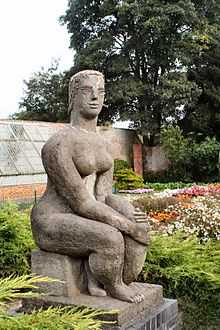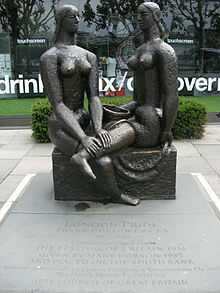Frank Dobson (sculptor)
| Frank Owen Dobson | |
|---|---|
| Born |
18 November 1888 London, England |
| Died |
22 July 1963 (aged 74) Princess Beatrice Hospital London[1] |
| Nationality | English |
| Education | Hastings School of Art, City and Guilds of London Art School |
| Known for | sculpture, drawing |


Frank Owen Dobson R.A. (1888–1963) was a British artist and sculptor.
Dobson attended the Hastings School of Art and was then an apprentice in the studio of Sir William Reynolds-Stephens. From 1910 to 1912 he attended the City and Guilds of London Art School in Kennington, South London. He served in The Artists Rifles during the First World War.[2]
Dobson began as a painter, and his early work was influenced by cubism, vorticism, and futurism. After World War I, however, he turned increasingly toward sculpture in a more or less realist style. From 1946 to 1953 Dobson was Professor of Sculpture at the Royal College of Art. He was elected to the Royal Academy in 1953.
While Dobson was one of the most esteemed artists of his time, after his death his reputation declined with the move towards postmodernism and conceptual art. However, in recent years a revival has begun. Dobson is now seen as one of the most important British sculptors of the 20th century.
The art critic Brian Sewell has recalled the great loss of much of Dobson's work after his death in his column in The Evening Standard 16 March 1995: "After his death, his widow asked me to help her clear the studio at Stamford Bridge, and I was appalled at the destruction that she wrought, smashing to smithereens small clay and terracotta models, tearing fine drawings in red and black chalk, hundreds of them, buring [sic?] the fragments in a dustbin, all because the subjects were erotic. I was allowed to save pastel drawings of exotic and rare birds, and watercolours of farmyards and a pastoral life long gone, but for the figures engaged in sexual congress, face to face, head to toe and doggy style as explicit as any by his old friend Eric Gill, Mrs Dobson would accept no plea that they were beautiful, no argument that they were fired by a quality not to be found in the “pure essence” of the torsos that survive, and like a ferociously implacable angel at the Last Judgment, she bent to the business of destruction."
References
- ↑ The Times Obituary 23 July 1963 page 13
- ↑ http://yourarchives.nationalarchives.gov.uk/index.php?title=Dobson%2C_Frank_(1887-1963)_Sculptor
Further reading
- Neville, Jason; Thompson-Pharoah, Lisa (1994). The Sculpture of Frank Dobson. London: Lund Humphries. ISBN 0-85331-641-4.
External links
| Wikimedia Commons has media related to Frank Dobson (sculptor). |
- Frank Dobson Article on The National Archives Website deals with some of Dobson's work
- Kneeling Torso by Frank Dobson
- The Fount by: Frank Dobson (1947-1948)
|